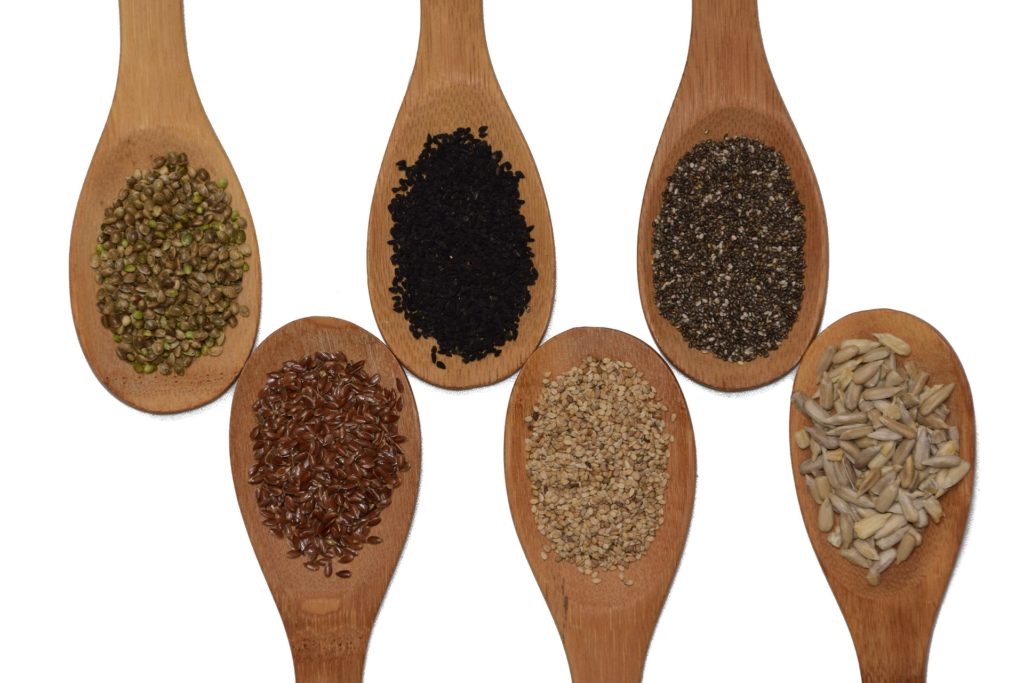Benefits of Seed Cycling for Menstrual and Perimenopausal Health

Benefits of Seed Cycling: Today we will be exploring how women can use flax, pumpkin, sesame, and sunflower seeds to support their hormones. Known as ‘seed cycling,’ this natural method is a powerful way to help the monthly shift from estrogen to progesterone and has a wide array of benefits, including eased symptoms of dreaded PMS. Although scientific evidence is lacking, there is an abundance of anecdotal evidence to support the benefits of this seed-savvy habit.
What is Seed Cycling?
Seed cycling is a natural method used to help regulate hormones by re-establishing the cyclical balance between estrogen and progesterone. It involves eating flax, pumpkin, sesame, and sunflower seeds at specific times of the month to support the two hormones as they fluctuate throughout the menstrual cycle.
The hormones that dominate the first half of your menstrual cycle are the follicle-stimulating hormone (FSH) and luteinizing hormone (LH) and estrogen. The second phase begins after ovulation and is governed by progesterone, as levels of estrogen drop off.
The benefits of seed cycling are quite simple: to promote the production estrogen in the first half of the cycle and encourage progesterone production in the second half.
Flax seeds are taken due to its phytoestrogen compounds from lignans, that mimic estrogen and help boost its production during the follicular (post-menstruation, pre-ovulation) phase. Consume Pumpkin seeds during this period due to their high zinc content, which helps gear up the body to produce progesterone in the second phase. Sesame seeds are taken in the luteal phase thanks to a polyphenol compound that may inhibit estrogen production. Sunflower seeds contain a high selenium content, which helps to support the liver.
Benefits of Seed Cycling
Benefits of Seed Cycling: Seed cycling may help regulate the natural hormonal cycle that occurs in women’s bodies throughout the lunar and their menstrual cycles. In doing so, seed cycling may have a positive influence on various hormonally-based symptoms, including:
-
- More regular periods
- Reduced acne
- Reduced symptoms of PMS
- Decreased symptoms of PCOS
- Reduced symptoms of endometriosis
- Decreased night sweats
- Improved fertility
- More energy
- Balanced mood
Unfortunately, there is not yet much scientific literature concluding seed cycling and hormonal balance.
There is, however, a deep-rooted connection between fertility, hormone health, and many of the various nutrients found in these seeds.
These four seeds pack a nutritional punch and contain fiber, magnesium, copper, vitamin E, manganese, thiamine, and healthy fats. These seeds are linked to reduced risks of developing diseases, including cancer and promote healthy cholesterol and blood pressure levels.
Despite the lack of scientific evidence, there is indeed a strong body of anecdotal evidence to support the theories behind seed cycling. With no harmful side effects to this gentle, food-based approach, why not give it a try for yourself?
Benefits of Seed Cycling: How To Seed Cycle
The protocol is pretty simple; you take one tablespoon of each of the two seeds that support either your menstrual/ follicular phase or luteal phase. Results are generally after a few rounds (a few months) of seed cycling.
Flax seeds and pumpkin seeds are consumed on days 1-14 of your cycle (a rough estimate of the menstrual and follicular phases). These seeds promote estrogen production and gear up for the next phase.
On days 14-28 of your luteal phase (or until you menstruate), you take sesame seeds and sunflower seeds. These two seeds promote progesterone and support the liver that has to process out the estrogen as it drops from the follicular phase.
It is best to opt for only organic seeds, which can be consumed either raw, roasted, or in a nut butter form. Since flax seeds are relatively hard to digest, best grind them up just prior to use, or grid up a larger batch in advance and store it in the fridge.
You can consume them like any supplement and just eat the seeds in the morning, but you can also honor your cycle with seed-friendly recipes. Get creative with seed cycling-friendly smoothies, muffins, or sprinkle the seeds on soups or salads. Get the benefits of seed cycling by making homemade bliss balls that contain 14 tablespoons of each of the two seeds relevant to each cycle, you could have a delicious hormone-supporting bite every day of the month!
Who Can Use Seed Cycling?
This method can be used to boost fertility or to ease the symptoms of menopause. During her fertile years, seed cycling can help women re-establish balance as the levels of estrogen and progesterone rise and fall pre- and post-ovulation. This can be helpful for the large percentage of women facing hormonal imbalances. Hormonal imbalances can occur for many reasons, including thyroid disorders, PCOS, endometriosis, over-exercising, over-consumption of estrogen-mimicking foods (like soy), or coming into contact with estrogen-mimicking compounds (like BPA plastics).
Benefits of Seed Cycling: Seed cycling can also help women as they transition into and post-menopause, since the body experience a radical drop in hormones during this time. With lower levels of estrogen and progesterone, studies suggest women are more likely to develop osteoporosis, and experience symptoms like hot flashes or weight gain. The natural hormonal boost can help alleviate such symptoms.
Summary
Benefits of Seed Cycling: Seed cycling is a natural way to promote hormonal balance between estrogen and progesterone as they fluctuate throughout the menstrual cycle. Flax seeds, pumpkin seeds, sesame seeds, and sunflower seeds are recommended due to their properties that include phytoestrogens, zinc, polyphenols, and selenium. Seed cycling can support younger women to boost fertility and ease symptoms of hormonal imbalances and can help older women as they transition into and post-menopause, to boost natural hormone production.
References
Benefits of Seed Cycling References:
Calado, Ana, et al. “The Effect of Flaxseed in Breast Cancer: A Literature Review.” Frontiers in Nutrition, vol. 5 July, 2018, doi:10.3389/fnut.2018.00004.
Edel, Andrea L, et al. “Dietary Flaxseed Independently Lowers Circulating Cholesterol and Lowers It beyond the Effects of Cholesterol-Lowering Medications Alone in Patients with Peripheral Artery Disease.” The Journal of Nutrition, vol. 145, no. 4, 2015, pp. 749–757., doi:10.3945/jn.114.204594.
Ferreira, Silvana R., and Alicia B. Motta. “Uterine Function: From Normal to Polycystic Ovarian Syndrome Alterations.” Current Medicinal Chemistry, vol. 25, no. 15 July 2018, pp. 1792–1804., doi:10.2174/0929867325666171205144119.
Franco, Oscar H., et al. “Use of Plant-Based Therapies and Menopausal Symptoms.” Jama, vol. 315, no. 23, 2016, p. 2554., doi:10.1001/jama.2016.8012.
Maybin, Jacqueline A., and Hilary O.d. Critchley. “Menstrual Physiology: Implications for Endometrial Pathology and Beyond.” Human Reproduction Update, vol. 21, no. 6 July 2015, pp. 748–761., doi:10.1093/humupd/dmv038.
Phipps, W. R. “Effect of Flax Seed Ingestion on the Menstrual Cycle.” Journal of Clinical Endocrinology & Metabolism, vol. 77, no. 5, Jan. 1993, pp. 1215–1219., doi:10.1210/jc.77.5.1215.
Richter, Dagmar, et al. “Effects of Phytoestrogen Extracts Isolated from Pumpkin Seeds on Estradiol Production and ER/PR Expression in Breast Cancer and Trophoblast Tumor Cells.” Nutrition and cancer, vol. 65, no. 5, 2013, pp. 739–745., doi:10.1080/01635581.2013.797000.
Rietjens, Ivonne M C M, et al. “The Potential Health Effects of Dietary Phytoestrogens.” British Journal of Pharmacology, vol. 174, no. 11, 2016, pp. 1263–1280., doi:10.1111/bph.13622.
Rodríguez-García, Carmen, et al. “Naturally Lignan-Rich Foods: A Dietary Tool for Health Promotion?” Molecules, vol. 24, no. 5, June 2019, p. 917., doi:10.3390/molecules24050917.
Schindler, Adolf E. “Climacteric Symptoms and Hormones.” Gynecological Endocrinology, vol. 22, no. 3, 2006, pp. 151–154., doi:10.1080/09513590600629134.
Taraborrelli, Stefania. “Physiology, Production, and Action of Progesterone.” Acta Obstetricia Et Gynecologica Scandinavica, vol. 94, 2015, pp. 8–16., doi:10.1111/aogs.12771.
Vitti, Alisa. Womancode: Perfect Your Cycle, Amplify Your Fertility, Supercharge Your Sex Drive, and Become a Power Source. HarperOne, 2014.
Wu, Wen-Huey, et al. “Sesame Ingestion Affects Sex Hormones, Antioxidant Status, and Blood Lipids in Postmenopausal Women.” The Journal of Nutrition, vol. 136, no. 5, Jan. 2006, pp. 1270–1275., doi:10.1093/jn/136.5.1270.




1 Comment
Leave your reply.